With a lead role in America’s longest-running sci-fi show Supernatural, Falkirk-born Ruth Connell says its all down to her secret weapon – the Scottish work ethic.
Supernatural is now in its 15th season, since it began in 2015. It centres on a pair of brothers who they travel throughout the country hunting down evil supernatural creatures.
I was brought up on my family’s farm, South Drum, in Bonnybridge. My grandma and grandpa were the next farm along. I remember my first confession – it was that I’d ridden my bike to my gran’s without permission. That was a big deal but things were different then, the roads were quieter. All that was there was our house and my gran’s house. I still had to say three Hail Marys though.
My mum and dad separated, and I moved to Laurieston with my mum when I was around 13 years old, but I was always at the farm at weekends. I’m an only child, but I get on really well with my two stepbrothers, Scott and Neil, my dad’s wife Moira’s children, who are a similar age.
One of my fondest memories, which was probably horrific for the adults, goes back to one year when we’d had terrible weather and it was a bad crop. The hay was too wet to make silage. It got to the end of summer and on the one good day, we had to get it all in.
It was all hands on deck, so the aunties, uncles and cousins were all out getting the hay in before it was ruined. I have idyllic memories of running about climbing on the hay bales with my cousins then going along to my grandma’s house afterwards where she would cook these gigantic mince rounds.
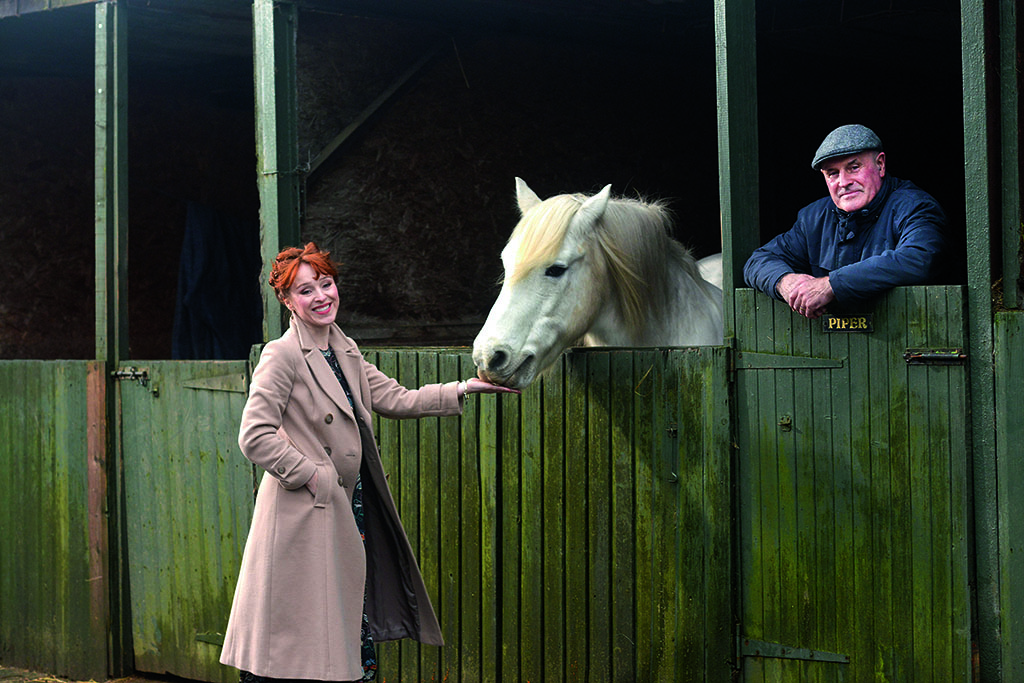
Ruth and her dad Davey Connell with Piper the pony at South Drum Stables (Photo: Angus Blackburn)
My grandma, Ruby Connell, was a land girl in the war, which is how she met my grandfather. He was a milk boy at the farm, and he worked his way up and eventually owned it. My grandma spoke fluent German and she used to do radio broadcasts during the war. It was a courtesy thing each country did to let them know about their prisoners of war.
Later she ran Bonnybridge Juniors – she was the only woman in the Scottish Football Association, and she was really good friends with Alex Ferguson; they were cut from the same cloth. They met at Falkirk and they just hit it off. She became lifelong friends with him and his wife; he mentions her in his book. My dad has been into football all his life. He was a coach at Falkirk and he’s a season ticket holder there now. I went to a game with him at Christmas. He managed Stenhousemuir for a time and was at East Stirlingshire. When he was at The Shire I remember volunteering there selling pies and Bovril.
Bonnybridge is known for its UFOs – Billy Buchanan, the councillor, is a family friend and I went to the community centre last time I was home as they have a local magazine that they produce – this edition mentioned my grandma and Billy was giving a talk.
It reminded me that a neighbour, Craig MacFarlane, swore blind he’d seen a flying saucer years before. There was all this press about it. The talk was in Bonnybridge library and there are beautiful paintings on the wall there that reference UFOs. I always figured that if the apocalypse happened I’d head for home to South Drum Stables and get beamed up to safety.
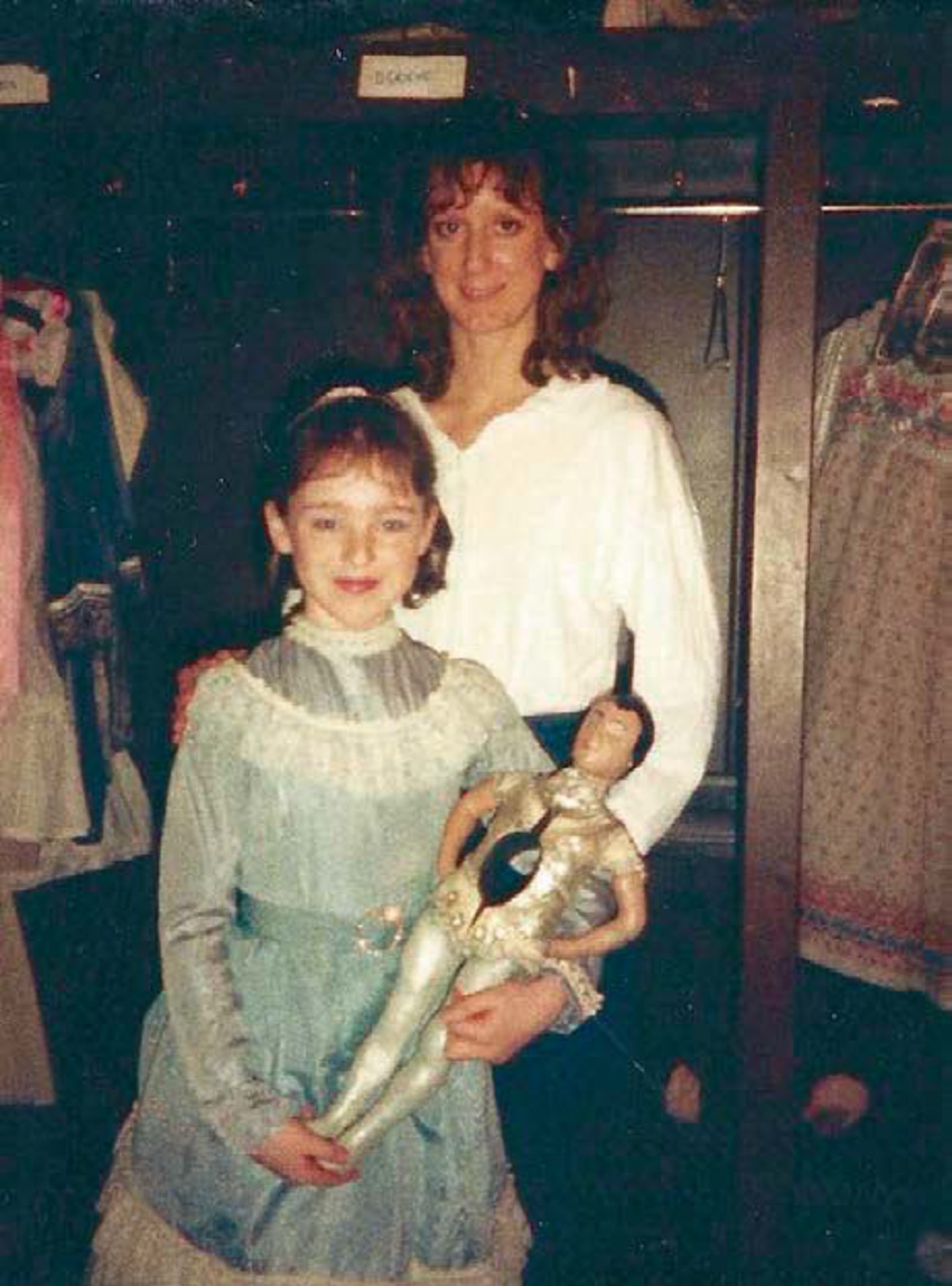
Ruth Connell as a child dancer with Scottish Ballet choreographer Kristin Johnson (Photo: Ruth Connell)
One of my earliest memories is of my Nana, my mum’s mum, taking me to Mathiesons the bakers in the old high street in Falkirk, with her pals when I was three or four. It was a real favourite of mine and I’m still happy to go there for a vanilla slice or a cream éclair. I was also taken to Callendar Park a lot as a child and Dollar Park. It’s great to see that something has been made of Callendar House now and that the park is still so well maintained. My best friend Roisin Connell got married there and so did my stepbrother Scott.
I love the Kelpies too, I think they’re beautiful and I love that Falkirk has something like this. The Wheel was a landmark, but now we have something really iconic; it’s a beautiful piece that can be recognised internationally. I spent a lot of my childhood and early adolescence at The Stenhouse School of dance in Melville Lane with Irene Langlands (now an MBE), and I used to practice my competition dances in the back garden of the farm.
I had this thing when I was little, I don’t know where it came from, watching films or something, that if I could do something like Judi Dench, my life would have meant something. It’s a bit far out, especially as I didn’t really understand professional acting, my school didn’t have a drama department or anything and I didn’t used to speak in front of anyone, I was really self-conscious.
I began ballet dancing when I was four and I always thought I’d be a dancer. I used to do dance classes with Scottish Ballet and my dad would sometimes take me through to Glasgow and look in the window at Scottish Ballet, and he would say to me that his footballers would struggle to keep up with the fitness that we were being pushed to.
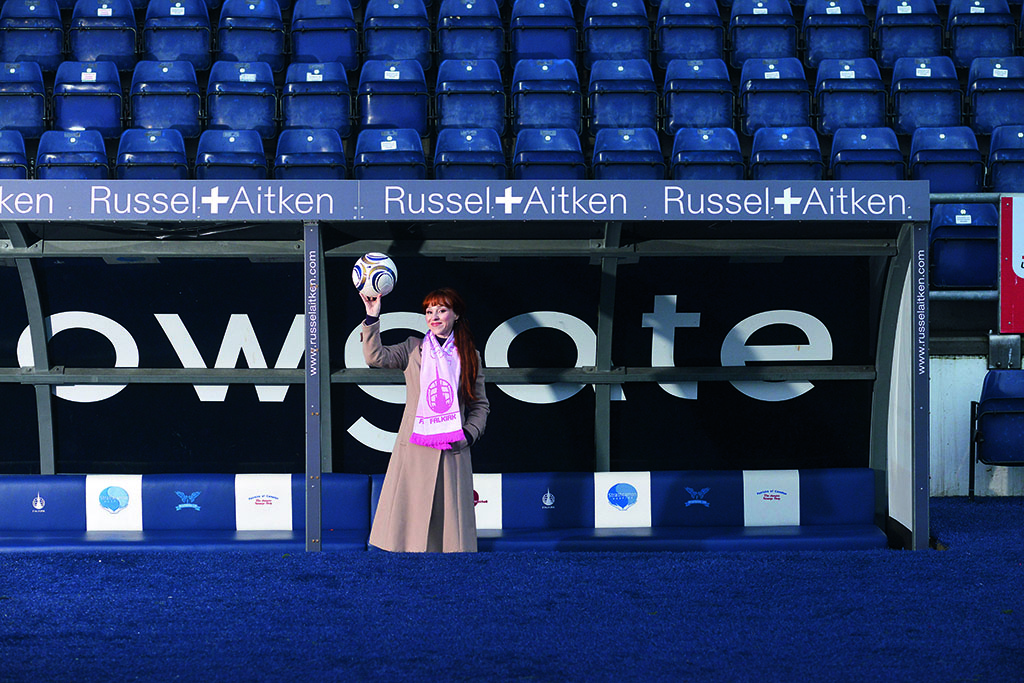
Ruth Connell checks out the dugout at Falkirk Stadium. (Photo: Angus Blackburn)
It was a lot of work, but I really loved it. I loved dancing with Scottish Ballet and just being part of the company. I think it goes back to watching my mum doing amateur dramatics when I was three or four years old, and I think because I’m an only child I really liked working in a team, being part of something that’s bigger than you are. I performed many roles with Scottish Ballet, including the lead of Clara in The Nutcracker, but then I failed my medical. That was a big blow because I’d always thought I was going to be in the Scottish Ballet.
I carried on dancing though. I was in Falkirk children’s theatre for a couple of years, mostly dancing, after I didn’t get into full-time dance school, and I choreographed my high school production of Joseph and the Amazing Technicolour Dreamcoat. I did my advanced ballet at the same time that the girls who had got on the programme would have sat theirs and I passed mine. I was Scottish ballet champion twice. I was always stubborn and tenacious, I don’t know when to give up sometimes, which is both a good and a bad thing.
After school I went to Glasgow University for about three weeks, but I hated it. So I called up my old dance teacher and there was a place for me at the Theatre School of Dance and Drama in Edinburgh. I fell in love with the city and I spend a lot of time there when I’m home as my mum lives there now.
Later, when I was working as a professional dancer, I ended up dating an actor. I would go and see him in plays at the Traverse and that seemed almost like something I could do. I wanted to be an actress, but I’d never say I wanted to be a film star, that seemed too grand, but I could see how I could be in a play.
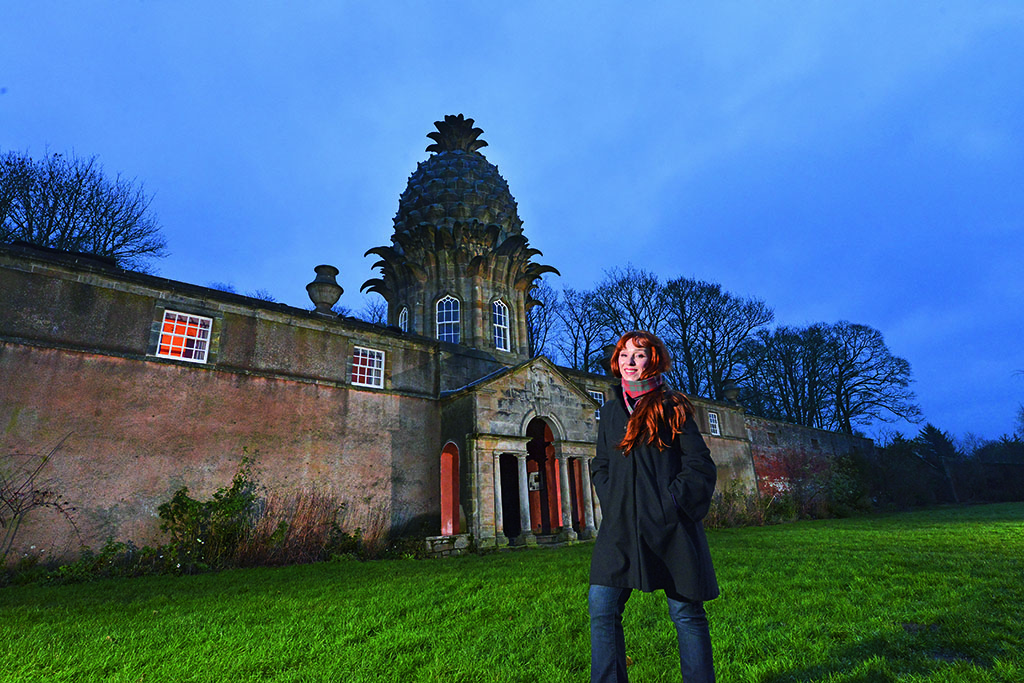
Ruth Connell in front of the Pineapple building in Dunmore Park (Photo: Angus Blackburn)
I went to drama college in London. I set up a theatre company there and my only rule was there had to be as many roles for women as there were for men, because we are half of the population. That’s my dose of feminism. When I graduated, it took three years to really get seen in Scotland. I had to try really hard to break into the Scottish theatre scene, which was all I wanted.
One of my biggest ambitions was to be in a play at the Royal Lyceum and three years after graduating from drama college I played one of the leads in Faust there, which was a really big production. I wrote letters and letters, then eventually I met artistic director Mark Thomson socially at an awards ceremony and the Lyceum were auditioning for Faust. They weren’t going to see me, but I think somebody cancelled, and I got in and got the job.
For a year and a half I worked solidly doing a play, a tour, a short film and a voiceover. I played Jessica in The Merchant of Venice during that time with Liam Brennan. To me, I was living the dream. Then your horizons expand even more and you think, well, maybe I would like to be in a television show. Now that I’m in Supernatural, I’m like, what else could I do?
I moved to America in 2011. I’ve always had enough success to keep me going, but 2013 was a really difficult year. I was googling ‘what should I do with my life?’ and doing quizzes along those lines. They worked out that I either wanted to be a writer or a director, which is the same nightmare of no certainty.
I kind of realised then that there’s some virtue and honour in just doing what you are doing. I think I was earning $13 a night if I went on in a 99-seat theatre in a play that I was doing in front of 700 people ten years before at Perth Rep, but I realised I’d rather die trying. I had to come home for six or seven months, but when I went back to America I really dug in, I was a lot more determined. I think sometimes if you hit rock bottom, you just have to keep going. The next year I got the part of Rowena, mother of the King of Hell, in Supernatural and it was the best year of my life.
When I turned up in the casting director’s office for Supernatural – he cast Glee and all these other big shows – and I could really play the role and I was authentically Scottish, I don’t think he could believe it.
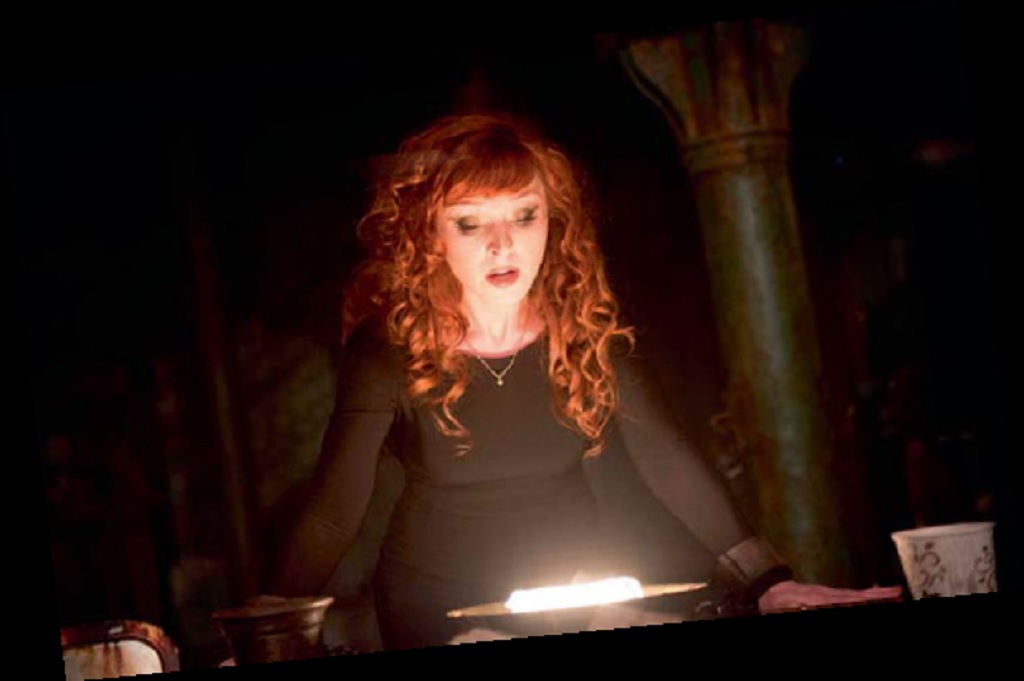
Ruth Connell as witch Rowena in hit US show Supernatural
The hardest thing for me has always been to get into the room, to get the auditions. Even now, I still don’t have a powerful agent or manager in LA to help me with that; it’s so tough when you’re not in your 20s and you’re not a man. But I’m optimistic and I’m really grateful for what’s happened.
Supernatural has been incredible; in one job it’s given me so many things. It’s a network TV show that is shown in many different countries, it’s got conventions all over, so I’m travelling around the world.
We’re now the longest running sci-fi show on American television and I’m the longest-running woman. The character works really well with other characters and she’s been well received. I get the best one-liners. I get on really well with the guys, so it’s just been a dream job and I hope that some of the exposure that I’m getting now will help me get other jobs here; I want to be in a BBC drama and I want to work at the National.
I’m having a great time, but I do miss home. I miss my family a lot. I miss square sausage and I miss the Scottish sensibility. I met some friends at the Festival in the summer when I was over and the first thing one of them did was take the mick out of me, and that’s what I miss – the Scottish sense of humour.
I didn’t realise how Scottish I was until I went 5,000 miles away, but it’s that Scottish ethic which was instilled into me by both of my parents – to work hard, to get your head down and get on with it – that has stood me in good stead. At conventions, when I get asked, I say that’s my secret weapon, the down-to-earth Scottish work ethic.
(This feature was originally published in 2016)
TAGS

